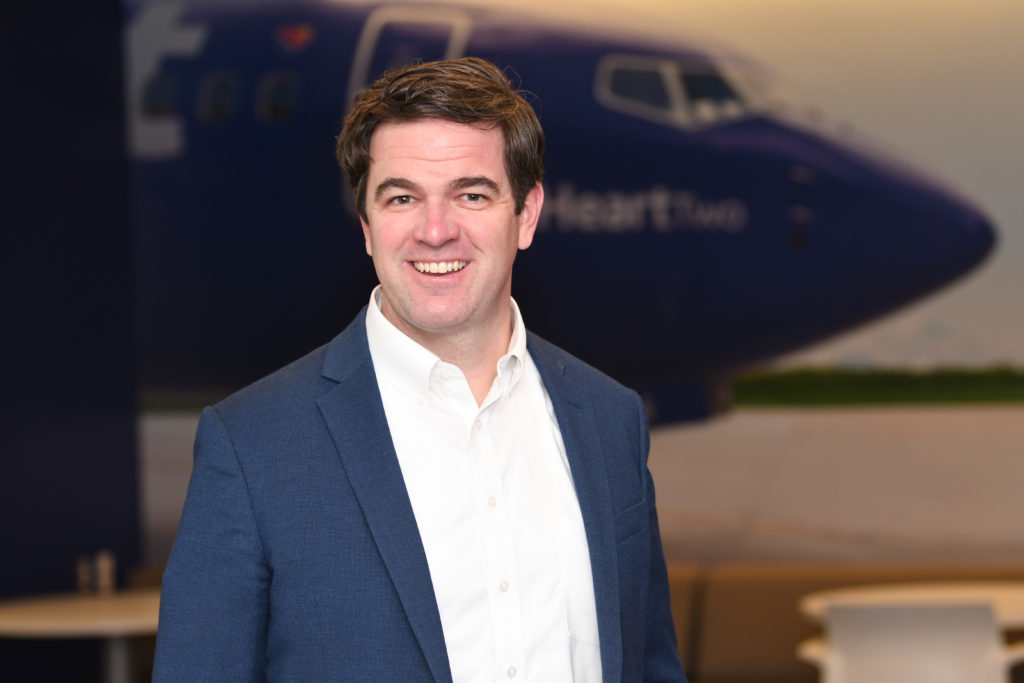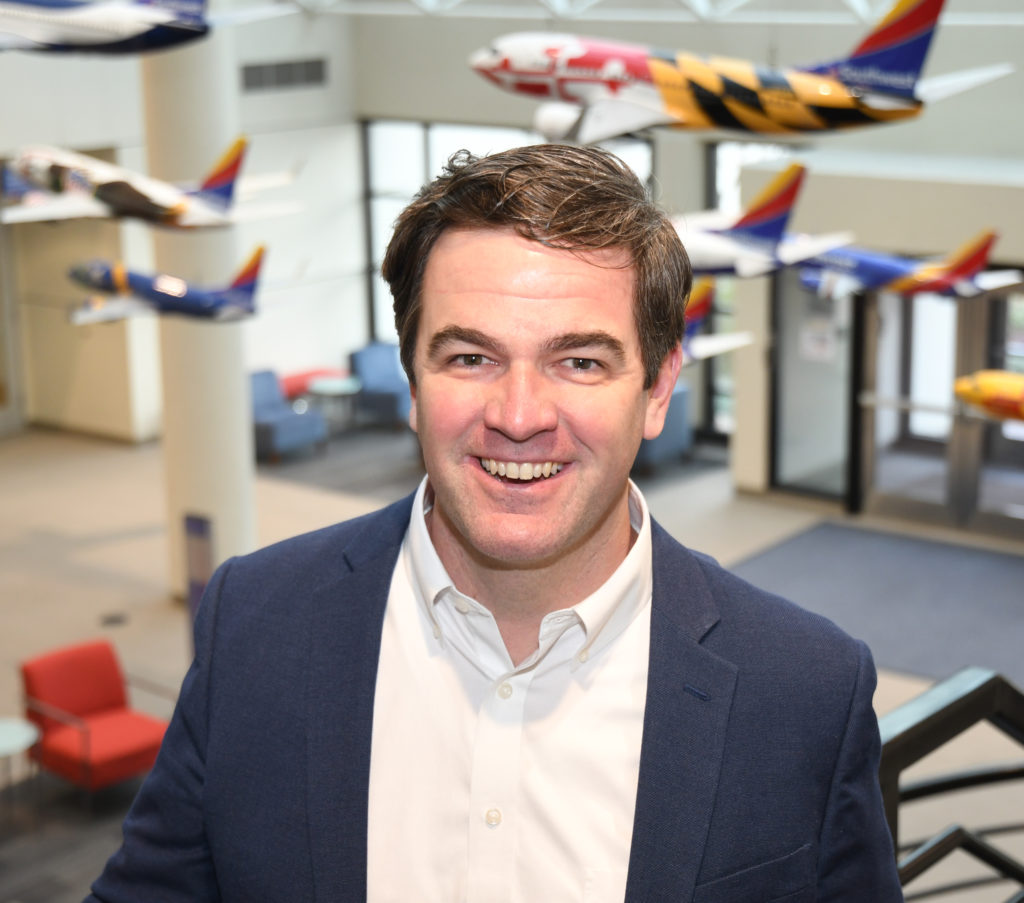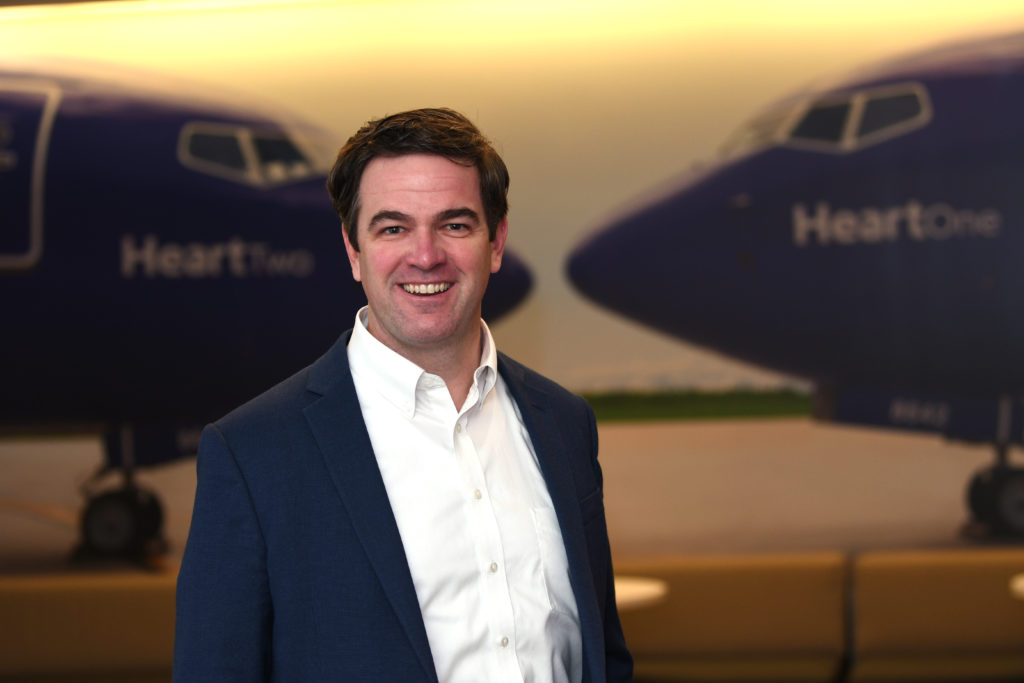
James Sheppard remembers his first flight on Southwest Airlines. As a freshman in high school, he and his father were on their way to San Antonio to watch the NBA All Star Game.
“I was excited to start, but then I saw Craig Miller of The Ticket was on our flight,” he says. “I found it cool that it was open seating, so I wiggled my way to get a seat close to him.”
Twenty-five years later, Sheppard is flying high as a senior litigation attorney for Southwest.
In 2019, he took two major multimillion-dollar lawsuits against the Dallas-based airline to trial in California. Each side in both cases had fought long and hard, but the disputes went to trial within two months of each other. Jury verdicts were returned in favor of Southwest in both cases.
Lawyers with knowledge of the two cases say the winning strategies had a common denominator: James Sheppard.
“I suspect that few in-house lawyers can say that they were at the helm of two back-to-back jury wins within three months,” says Norton Rose Fulbright partner James V. Leito IV. “James he has the rare ability to get into the weeds of all facets of litigation while still seeing the big picture and guiding overall case strategy.”
Citing Sheppard’s success in these and other cases, the Association of Corporate Counsel’s DFW Chapter and The Texas Lawbook are honored to present the Senior Counsel of the Year for a Large Legal Department Award to Southwest Airlines Senior Counsel James Sheppard.
The ACC-DFW and The Lawbook will honor all finalists and announce the winners of the 2019 Outstanding Corporate Counsel Awards Jan. 30 at the George W. Bush Institute.
“The sport of rowing is an incredible metaphor for teamwork… a strong individual effort means little unless it is in sync with the other rowers in the boat.”
“James is one of the most hands-on in-house counsel I have ever dealt with,” says Baker Hostetler partner Doug D’Arche. “He is very involved in all aspects of a case and is a very strategic thinker. I would liken his approach to litigation to that of a chess player. He is always thinking several moves ahead and considering possible outcomes and repercussions.”
Southwest General Counsel Mark Shaw says Sheppard “has become a key player” for the company’s legal department.
“He has very good judgment and excellent communication skills – up, down and sideways,” Shaw says. “He is very deserving of this honor.”
Sheppard, a former high school social studies teacher at Jesuit College Prep, says working at Southwest for the past five years has been amazing.
“Southwest has 60,000 employees, but it still feels like a small company,” he says.
Sheppard was born and lived for a few years in northeastern New Jersey. His father worked for J.C. Penney, which relocated the family to North Dallas when the retailer moved its headquarters to Plano. His mother was a school teacher and worked as an administrator at Collin College for a few years.
The only lawyer in his family was an uncle who worked as in-house counsel for Abbott Laboratories in Chicago.
The real influence on Sheppard’s journey into law was Professor David Twomey at Boston College, where Sheppard majored in history.
Twomey taught business law but had to postpone some classes when he was appointed to the Presidential Emergency Board attempting to resolve the labor dispute between United Airlines and its machinist union.
“Professor Twomey had an amazing impact on me and others to be a lawyer, but he also inspired me as an educator,” Sheppard says.
After graduating in 2002, Sheppard went to work as a paralegal at a Boston litigation firm, Dwyer & Collora. He worked on a lawsuit in which the ownership of an original copy of the Bill of Rights was in dispute.
In August 2003, he moved to Dallas to teach social studies at Jesuit, the high school from which he graduated. He also served as head coach of the school’s new rowing team.
“The sport of rowing is an incredible metaphor for teamwork because a successful boat requires a coordinated, balanced effort among the team,” he says. “In rowing, a strong individual effort means little unless it is in sync with the other rowers in the boat.”
In 2006, The Dallas Morning News published a letter to the editor from Sheppard that supported the repeal of the Wright Amendment, a federal law that limited the number of flights and destinations Southwest could fly out of Love Field.
Sheppard says he enjoyed his three years at Jesuit, but law school beckoned.
In 2009, he graduated from Georgetown University Law Center and then clerked for the Texas Supreme Court.
“My favorite oral argument from the term was when Jim Ho (then-Texas solicitor general and now a judge on the U.S. Court of Appeals for the Fifth Circuit) argued against Jeff Boyd (then a Thompson & Knight partner and now a Texas Supreme Court justice) in a case about the assignment of lottery winnings,” he says.
“It was the battle of two great, smart lawyers,” he says. “It was like watching Clemson versus LSU. Yes, I like sports metaphors.”

In 2010, Sheppard joined the Dallas office of Diamond McCarthy, where he had clerked during law school. The firm has a prominent bankruptcy litigation practice. Sheppard worked as a lawyer for the trustee on the infamous Marc Drier law firm bankruptcy.
“It presented interesting legal issues because it was like a Ponzi scheme operating out of a law firm,” he says.
In late 2014, Sheppard applied for a position in the legal department at Southwest.
“I wasn’t actively looking, but as a fifth-year lawyer at a firm, you start thinking about your future and whether you want to be a partner or not,” he says. “Southwest as a company and my background fit the job description. It was also attractive as a place to build a career with fun company culture.”
Sheppard landed the position as a litigation attorney in Southwest’s legal department in March 2015. He and his team handle commercial litigation, consumer class actions, vendor and contract disputes, IP and trademark litigation and high-exposure insurance claims.
Southwest GC Mark Shaw also tasked Sheppard with managing the department’s e-discovery team to help the preservation, collection and review of relevant data in pending legal matters.
Then came the summer of 2019.
Sheppard was the lead Southwest in-house lawyer on two major lawsuits that he had been working on for most of his five years with the company.
One case was a $63 million wrongful death lawsuit brought by the family of a man who suffered a massive pulmonary embolism on a flight in 2014. The second was a $25 million breach of contract lawsuit by a tech startup that wanted to develop an inflight travel guide for Southwest passengers.
Both cases were bitterly fought in the pretrial stages for four years. The wrongful death case was set for trial in early June. The contract dispute was scheduled for trial in August. The odds are overwhelmingly against any civil lawsuit making it to trial. That these two cases would actually go before juries three months apart was unthinkable.
But both did in California.
“I spent a lot of time in hotels and flights back and forth from Dallas to California,” he says. “My boss jokingly asked me if I was looking for schools in California.”
“We get very involved in litigation matters,” Sheppard says. “We will attend depositions and prep sessions to make sure that our employees feel comfortable and confident in the process. As for trial strategy, we are very hands-on.”
The first case, Ilczyszyn v. Southwest Airlines, went to trial in June 2019. Plaintiff’s lawyers argued that financial analyst Richard Ilczyszyn, a frequent guest on CNBC, went into medical distress in the lavatory of a Southwest flight between Oakland and Orange County nine minutes before landing.
Ilczyszyn’s family claimed that the Southwest flight crew knew he was in serious medical trouble but were negligent in their assessment of the situation. The flight crew believed it was a potential security threat and the pilots reported it to law enforcement.
Sheppard says what happened to Ilczyszyn was a horrible tragedy, but that the flight crew could not have prevented his death and was not legally at fault.
“James’ great skill in the Ilczyszyn case was devising the ‘Path to Zero.’ After an unsuccessful mediation, James identified three paths for Southwest to win,” says Dallas trial lawyer Andy Ryan, who was part of the trial team.
The first avenue involved Sheppard and the defense team arguing that the Aviation Transportation Security Act, a 2001 law passed as a result of the Sept. 11 terrorism attacks, provided immunity to the defendants against the personal injury claims because the incident arose from a security concern.
The Southwest legal team brilliantly hired Jon Cohn of Sidley Austin, who was the winning lawyer in the Supreme Court’s only case interpreting ATSA immunity.
“We needed to show that airplane crews have a lot of duties in-flight. They don’t just serve drinks,” Sheppard says. “The case presented unique legal questions, but it also required careful coordination with our witnesses and insurance partners.”
The legal move resulted in a partial win. The pilots, the judge ruled, had merely relayed the report to air traffic control.
The second path to a zero-dollar verdict for the plaintiffs, according to Sheppard’s plan, rested in the defense team convincing the jury that the flight crew correctly judged the incident to be a security concern.
Sheppard, according to Ryan, worked with the flight crew “to prepare them for a grueling trial.”
The third path was a factual argument: causation. Southwest provided the Oakland jury with expert medical testimony that Ilczyszyn tragically “suffered from a medical event that he could not have survived, whether in the air or on the ground,” Ryan says.
“The ‘Path to Zero’ worked,” says Ryan, who handled the third path during the trial. “The immunity arguments were important before and during trial to prevent the plaintiffs from blaming Southwest for events beyond its control. The flight crew were credible witnesses, examined skillfully by expert aviation counsel. The jury believed that Southwest’s crew and company treated the matter seriously and with the utmost respect for the passenger’s family.”
The trial lasted five weeks. The jury deliberated for three and a half hours. The verdict was unanimous that Southwest did not cause Ilczyszyn’s death.
Sheppard had no time to celebrate his courtroom victory. Only weeks later, he was on a flight back to California – this time to Santa Monica – to start the second jury trial.
SwiftAir promised to develop a special inflight travel guide portal for Southwest passengers to use during their flight.
Southwest ended the relationship with SwiftAir in 2013 after the airline says the tech startup missed deadlines, had products with typos and grammatical errors, and was slow and unreliable.
SwiftAir sued for $25 million in a breach of contract case. Like the first trial, Sheppard worked closely with D’Arche to develop a legal strategy and trial themes for the case.
Prior to trial, Southwest obtained the dismissal of most of the vendor’s claims under the Airline Deregulation Act, which preempts state-law claims related to an airline’s services.
“SwiftAir seemed to think that if they built it, Southwest was required to put it on the planes no matter how crappy it was,” D’Arche told reporters at the trial.
After hearing three weeks of testimony and arguments, the jury deliberated only three hours in providing Southwest with a complete victory in September.

“For both trials, they were truly team efforts,” Sheppard says. “They required careful and deliberate coordination between the outside lawyers, our department, internal business partners and witnesses. In addition, we had the support and backing of our company’s leadership to take these cases to trial.”
D’Arche says Sheppard is just being modest.
“As an outside lawyer working with James, I have to constantly be on my toes and be well prepared, because I can always expect thoughtful and probing questions from James,” D’Arche says.
“[Sheppard] is very involved before and after each day of trial in assessing and evaluating the case and in preparing for the next day of trial,” he says. “For example, during our recent trial, James was highly involved in making decisions about what witnesses to call at trial. He made decisions about not calling certain witnesses that were scheduled to testify based on his assessment of the evidence and the jury.
“Interviews with the jurors after the trial proved that his decisions were spot on.”
Other lawyers agree.
“A large part of being a successful trial lawyer is knowing which cases to take to trial, and to do that, one must develop successful strategies to narrow the case and prepare what remains to achieve the best possible result,” says Leito, who nominated Sheppard for the award.
“James did all of this in these two cases,” he says. “Southwest’s willingness to let James take the lead on two diverse, high-stakes matters shows the trust and judgment that they have in him, his management of outside counsel and his ability to navigate a variety of cases to successful resolution before a jury.”
